
Well done. You’ve mastered The 200+ Best Afrikaans Words for Beginners! Now it’s time to tackle some intermediate Afrikaans words and phrases. In this article, we’ve compiled the most common ones for you and included their classification for easy access. Let us know in the comments if you’re battling to understand anything!
(Wondering whether you’ll be able to learn Afrikaans beginner and intermediate words easily? Check out our blog post Is Afrikaans Hard to Learn?)
 Table of Contents
Table of Contents
- Intermediate Afrikaans Words – SELFSTANDIGE NAAMWOORDE / “Nouns”
- Afrikaans Intermediate Words – TELWOORDE / “Counting Words”
- Afrikaans Intermediate Words – BYVOEGLIKE NAAMWOORDE / “Adjectives”
- Afrikaans Intermediate Words – Voornaamwoorde / “Pronouns”
- Afrikaans Intermediate Words – WERKWOORDE / “Verbs”
- Afrikaans Intermediate Words – KOPPELWERKWOORDE / “Linking Verbs”
- Afrikaans Intermediate Words: BYWOORDE / “Adverbs”
- Afrikaans Intermediate Words: Voegwoorde / “Conjunctions”
- Afrikaans Intermediate Words – VOORSETSELS / “Prepositions”
- Learn the Most Common Afrikaans Intermediate Words Easily at AfrikaansPod101.com!
1. Intermediate Afrikaans Words – SELFSTANDIGE NAAMWOORDE / “Nouns”
Nouns are among the most common Afrikaans intermediate words. They are, essentially, the names of all persons, things, and places, including abstract things like qualities, states, thoughts, and ideas.
Just like English, the Afrikaans language distinguishes between nouns, proper nouns, and different categories of pronouns, which we’ll discuss in more detail.
In phrases or sentences, the main type of noun is recognizable when it’s preceded by:
- ★ an article, i.e. die (“the”) or ‘n (“a”);
★ a possessive pronoun (learn more about Afrikaans pronouns in this article);
★ an adjective (learn about Afrikaans adjectives here); and/or
★ main verbs. (And learn here about Afrikaans verbs.)
Consider the nouns, articles, adjectives, verbs, and pronouns in these intermediate Afrikaans sentences:
- Ek het katte as troeteldiere. / “I have cats as pets.” [verb and noun]
- Hou asseblief my tas vas. / “Please hold my suitcase.” [possessive pronoun and noun]
- Geniet jy jou koffie? / “Are you enjoying your coffee?” [possessive pronoun and noun]
- Waar is die naaste hotel, asseblief? / “Where is the closest hotel, please?” [article, adjective, and noun]
- Daardie wilde perde hardloop besonder vinnig. / “Those wild horses are running remarkably fast.” [demonstrative adjective, adjective, and noun]
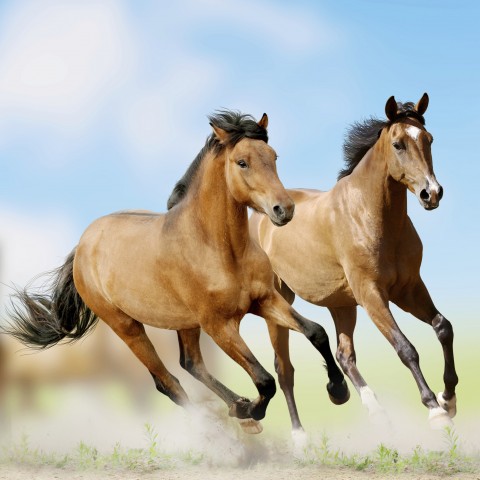
Daardie wilde perde hardloop besonder vinnig. / “Those wild horses are running remarkably fast.”
| Selfstandige Naamwoorde / “Nouns” | |
| Afrikaans | English |
| Mense en Familie / “People and Relatives” | |
| ouers | “parents” |
| vader | “father” |
| moeder Note: These two terms for parents serve as both formal forms of address and nouns. | “mother” |
| man / vrou | “husband” / “wife” |
| grootouers / kleinkinders | “grandparents” / “grandchildren” |
| familie / gesin Note: Familie refers to close and extended family, as well as relatives, while gesin refers to the nuclear family (two parents and their offspring). | “relatives” / “family” |
| neef OR nefie | “cousin” – male |
| nig OR niggie | “cousin” – female |
| Liggaamsdele / “Body Parts” | |
| ledemate | “limbs” |
| ooghare / wimper(s) | “eyebrows” / “eyelash(es)” |
| wang(e) / neusgat(e) / neusbrug | “cheek(s)” / “nostril(s)” / “bridge of the nose” |
| bo-lip / onder-lip / mondhoek(e) | “upper lip” / “lower lip” / “corner(s) of the mouth” |
| ken / tandvleis / bo-tand(e) / onder-tand(e) Note: Tandvleis (“gums”) is an irregular noun, as it’s written in the singular but used like an uncountable or mass noun. | “chin” / “gums” / “upper tooth (or teeth)” / “lower tooth (or teeth)” |
| skouer(s) / elmboog OR elmboë / pols(e) | “shoulder(s)” / “elbow(s)” / “wrist(s)” |
| bors / bors(te) / maag Note: No, it’s not a mistake! The word bors has a double meaning, as you can see. The context in which it is used will best show which is which. Also, when bors is suffixed with an –e, its plural form indicates “chests” (borse). The plural for “breast” (bors) is shown with a different suffix: -te, as in borste (“breasts”). | “chest” / “breast(s)” / “stomach” |
| heup(e) / knieg OR knieë / enkel(s) | “hip(s)” / “knee(s)” / “ankle(s)” |
| agterkop / skouerblad OR skouerblaaie / rug / boud(e) | “back of the head” / “shoulder blade(s)” / “back” / “buttock(s)” |
| Tyd / “Time” | |
| sekonde | “second” |
| dekade / eeu / millenium | “decade” / “century” / “millennium” |

Nou, more, gister. / “Now, tomorrow, yesterday.”
| Selfstandige Naamwoorde / “Nouns” (cont.) | |
| Afrikaans | English |
| Alledaagse Items / “Everyday Items” | |
| notaboek / storieboek / vorm / papier Note: Like in English, vorm (“form”) has several meanings in Afrikaans. As a noun, it can mean
| “notebook” / “storybook” / “form” / “paper” |
| skootrekenaar / tafelrekenaar / oorfoon OR oorfone / mikrofoon / televisie / drukker Note: In Afrikaans, we use oorfone to indicate both earphones and headphones. Also, drukker is seldom used in the vernacular; most often, we just use “printer.” | “laptop (computer)” / “desktop (computer)” / “earphone(s)” / “microphone” / “television” / “printer” |
| lessenaar / kantoor / studeerkamer / boekrak | “desk” / “office” / “study” / “bookcase” |
| baadjie / onderklere / romp / denims / slaapklere / slaapkamer / wasgoed Note: Onderklere (“underwear”) and slaapklere (“sleepwear”) are irregular nouns because the plural form can refer to a single item or more. Also, in Afrikaans, denims (the plural form) indicates the garment, while denim indicates the fabric. “Jeans” is also a popular English loanword in Afrikaans. | “jacket” / “underwear” / “skirt” / “jeans” / “sleepwear” / “bedroom” / “laundry” |
| langbroek(e) / kortbroek(e) / romp / T-hemp / sweetpak / tekkies Note: The English terms “long pants” and “shorts” are always used in the plural. However, Afrikaans has singular and plural forms for these words. ‘n Langbroek refers to one pair of long pants, while langbroeke refers to more than one pair of long pants. | “long pants” / “shorts” / “skirt” / “T-shirt” / “tracksuit” / “sneakers” |
| ketel / stoof / oond / wasbak / kombuis | “kettle” / “stove” / “oven” / “sink” / “kitchen” |
| bad / stort / kraan / wasbak / badkamer | “bath” / “shower” / “tap” / “basin” / “bathroom” |
| Beroep / “Profession” | |
| mediese dokter / pasiënt / spesialis OR internis / chirurg | “medical doctor” / “patient” / “specialist” OR “internist” / “surgeon” |
| apteker / tandarts / oogkundige / pediater / veearts | “pharmacist” / “dentist” / “optometrist” / “pediatrician” / “vet” |
| lykskouer / begrafnisondernemer / lykbesorger / predikant / pastoor | “coroner” / “undertaker” / “mortician” / “minister” / “pastor” |
| werktuigkundige / petroljoggie | “car mechanic” / “fuel pump attendant” |
| bestuurder / assistent / klerk / personeel / ontvangsdame Note: To specify, one can create compounds with these words by adding other nouns like
This rule excludes ontvangsdame (“receptionist”), which is used as-is in most contexts. Also, bestuurder has a double meaning in Afrikaans. It means “manager” and also “driver of vehicles”: Ek is die bestuurder van die huurmotor. / “I am the driver of the rental car.” | “manager” / “assistant” / “clerk” / “personnel” OR “staff” / “receptionist” |
| verkoopspersoon / winkelier | “salesperson” / “shopkeeper” |
| skoolhoof / onderhoof / departementshoof / skoolkind / bibliotekaresse – biblioteekaris | “school principal OR headmaster” / “deputy principal OR headmaster” / “head of department” / “school student” / “librarian (female – male)” |
| dekaan / dosent / student | “dean” / “lecturer” / “student” |
| vlieënier / kajuitbeampte / ingenieur | “pilot” / “flight attendant” / “engineer” |
| kelner / kok / sjef / skoonmakers | “waiter” / “cook” / “chef” / “cleaners” |
| Kos en Drank / “Food and Drink” | |
| braaivleis / potjiekos / maalvleis / boerewors Note: Boerewors is a sausage with a unique recipe created long ago by the Afrikaners. Try it when you’re visiting! Read this article to learn what potjiekos is, and to explore the best South African foods. | “barbeque” / potjiekos / “ground OR minced meat” / literally: “farmer’s sausage” |
| lamsvleis / skaapvleis / wildsvleis / biefstuk | “lamb” / “mutton” / “venison” / “beefsteak” |
| appel / peer / piesang / mango / tamatie / kool / ui | “apple” / “pear” / “banana” / “mango” / “tomato” / “cabbage” / “onion” |
| macaroni-en-kaas / spaghetti / frikadelle / sousbone | “macaroni and cheese” / “spaghetti” / “meatballs” / “baked beans” |
| roosterbrood / spek / ontbyt | “toast” / “bacon” / “breakfast” |
| peper / sout / spesery(e) / knoffel | “pepper” / “salt” / “spice(s)” / “garlic” |
| wyn / bier / whiskey / drankie / drank | “wine” / “beer” / “whiskey” / “a drink” / “alcoholic beverages” |
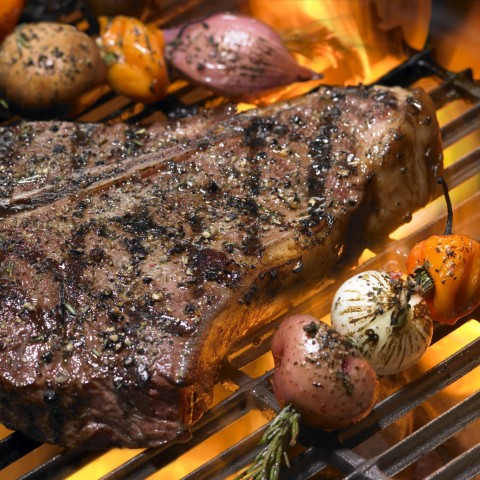
Braaivleis is ‘n gewilde dis in Suid Afrika. / “Barbequed meat is a popular dish in South Africa.”
| Plekke en Geboue / “Places and Buildings” | |
| hospitaal / apteek / kliniek / noodgevalle / ongevalle / lykshuis / begrafnisonderneming | “hospital” / “pharmacy” / “clinic” / “emergencies” (as in the ER or “emergency room”) / “casualties” / “mortuary” / “funeral parlor” |
| biblioteek / supermark / pretpark / restaurant / teetuin | “library” / “supermarket” / “amusement park” / “restaurant” / “tea garden” |
| wassery / haarkapper / skoonheidskundige / herstelwinkel | “laundry” / “hairdresser” / “beautician” / “repair shop” |
| Diere / “Animals” Also, be sure to take a look at our comprehensive list of animals in Afrikaans! | |
| hoender / haan / hen / kuiken | “chicken” / “rooster” OR “cock” / “hen” / “chick” |
| donkie / ponie / muil | “donkey” / “pony” / “mule” |
| rot / marmot / haas OR konyn Note: Another Afrikaans translation for “guinea pig” is proefkonyn (literally: “test rabbit”). This term is only used in the context of experimentation. In the past, proefkonyne were the test subjects in laboratory settings, but over time, scientists started using other animals and the term changed to proefdiere (“test animals”). In the vernacular, it can now refer to someone who is testing out a brand-new product or who is part of a medical trial, for instance. | “rat” / “guinea pig” / “rabbit” |
| papegaai / kanarie / duif / mossie / vink | “parrot” / “canary” / “pigeon” / “sparrow” / “finch” |
| goudvis / dolfyn / haai | “goldfish” / “dolphin” / “shark” |
| Abstrakte Naamwoorde / “Abstract Nouns” | |
| liefde / vreugde / vrede / geluk | “love” / “joy” / “peace” / “happiness” |
| woede / hartseer / lyding | “anger” / “sadness” / “suffering” |
| begeerte / wens / besluit / keuse | “desire” / “wish” / “decision” / “choice” |
| gedagte / idee / geheim / belofte / leuen | “thought” / “idea” / “secret” / “promise” / “lie” |

Liefde, vrede, vreudge, geluk / “Love, peace, joy, happiness”
2. Afrikaans Intermediate Words – TELWOORDE / “Counting Words”
These are the words that have to do with numbers, and in the Beginner Words article we mentioned earlier, we looked at the primary counting words (also called cardinal numbers) one through ten. Now, as you approach intermediate-level Afrikaans, it’s time to study the cardinal numbers from elf (“eleven”) onwards.
We’re also going to take a look at the words for ordinal numbers. For more detailed information on the topic, be sure to read this article about counting in Afrikaans.
| Kardinale Getalle / “Cardinal Numbers” In Afrikaans, “cardinal numbers” are also called hooftelwoorde. | |
| Afrikaans | English |
| elf | “eleven” |
| twaalf | “twelve” |
| dertien | “thirteen” |
| veertien | “fourteen” |
| vyftien | “fifteen” |
| sestien | “sixteen” |
| sewentien | “seventeen” |
| agtien | “eighteen” |
| negentien Note: Up to here, the number words are irregular and need to be memorized. From this point on, though, the number words are formed following the same pattern, as demonstrated below (counting from twenty to thirty). You’ll see that only the tens, hundreds, thousands, etc. change, and therefore need to be memorized. | “nineteen” |
| twintig | “twenty” |
| een-en-twintig | “twenty-one” |
| twee-en-twintig | “twenty-two” |
| drie-en-twintig | “twenty-three” |
| vier-en-twintig | “twenty-four” |
| vyf-en-twintig | “twenty-five” |
| ses-en-twintig | “twenty-six” |
| sewe-en-twintig | “twenty-seven” |
| agt-en-twintig | “twenty-eight” |
| nege-en-twintig | “twenty-nine” |
| dertig | “thirty” |
| een-en-dertig, etc. | “thirty-one,” etc. |
| veertig | “forty” |
| vyftig | “fifty” |
| sestig | “sixty” |
| sewentig | “seventy” |
| tagtig | “eighty” |
| negentig | “ninety” |
| honderd | “hundred” |
| duisend | “thousand” |
| miljoen | “million” |
| miljard Note: A common mistake that even native Afrikaans speakers make is to translate the American English “billion” to biljoen in Afrikaans. That’s understandable, because they sound very similar. However, they don’t mean the same number at all; if you’re a biljoenêr in Afrikaans, you’re much wealthier than a billionaire in American English! This is because an Afrikaans biljoen refers to the number ten to the power of twelve (1012, which is 1,000,000,000,000), while the English billion only refers to the number ten to the power of nine (109, which is 1,000,000,000). These numbers are mind-boggling, aren’t they?! The Afrikaans word for one billion (109) is miljard. If an Afrikaans person is lucky enough to be this wealthy, we call them a multi-miljoenêr (literally: “multi-millionaire,” but meaning “billionaire”). | “billion“ |
| biljoen | “one-hundred-billion” |
| biljard | “trillion” |
| triljoen | “one-hundred-trillion” |
| triljard | “quadrillion” |
| kwatriljoen | “one-hundred-quadrillion” |
| kwatriljard | — |
| To briefly explain the rules: A. 11 – 19, 20, 30, 40, etc.: The numbers eleven (elf) through nineteen (negentien), and all the tens (twintig, dertig, veertig ens / “twenty, thirty, forty, etc.”) are irregular number words and should just be memorized. B. 21 – 29, 31 – 39, etc.: For the numbers between the tens, so to speak, and up to a hundred, use the following formula. (Also note that, in Afrikaans, these numbers start with the lower cardinal number.) Lower cardinal number + Conjunction en (“and”) + Higher cardinal number Examples: een-en-twintig, twee-en-twintig, drie-en-twintig (“twenty-one, twenty-two, twenty-three”). C. 100+: From a hundred onwards, the formula is similar to that used for English numbers, meaning they start with the higher cardinal number: Higher cardinal number + Conjunction en (“and”) + Lower cardinal number Examples: honderd-en-een, honderd-en-twee, honderd-en-drie (“hundred-and-one, hundred-and-two, hundred-and-three”). | |
| |
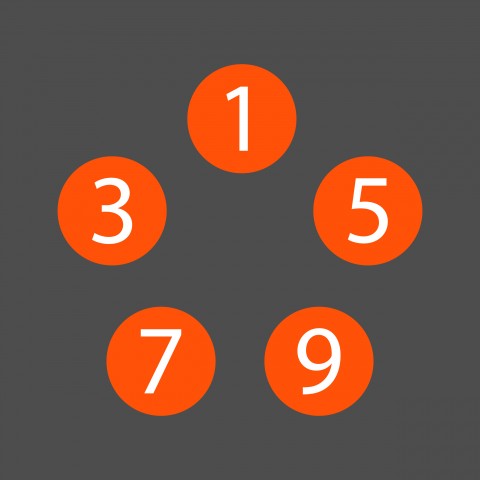
Ongelyke getalle / “Uneven numbers”
| Ordinale Getalle / “Ordinal Numbers” Ordinal numbers indicate the position of an item on a list. In Afrikaans, they’re also called rangtelwoorde. | |
| Afrikaans | English |
| eerste | “first” |
| tweede | “second” |
| derde | “third” |
| vierde, etc. | “fourth,” etc. |
| twintigste | “twentieth” |
| een-en-twintigste, etc. | “twenty-first,” etc. |
| honderd-en-eerste, etc. | “hundred-and-first,” etc. |
| duisend-en-eerste, etc. | “thousand-and-first,” etc. |
| To briefly explain the rules: A. 1st, 3rd: In Afrikaans, the first (eerste) and the third (derde) ordinal number words are irregular. B. 4th – 19th: The ordinal numbers from vier (“four”) to negentien (“nineteen”) are formed by simply adding the suffix -de to the cardinal numbers. For example: vierde, vyfde … agtiende, negentiende (“fourth, fifth … eighteenth, nineteenth”). C. 8th, 9th: The two exceptions are “seventh” and “eighth,” which get different suffixes. “Eighth” gets the suffix -ste (agtste) and “ninth” gets the suffix -nde (negende). D. 20th, 21st, etc: From twintig (“twenty”) onward, the ordinal words are formed by adding the suffix -ste to the normal counting words. Examples: twintigste, een-en-twintigste … dertigste, een-en-dertigste … honderdste … duisendste (“twentieth, twenty-first … thirtieth, thirty-first … hundredth … thousandth”). | |
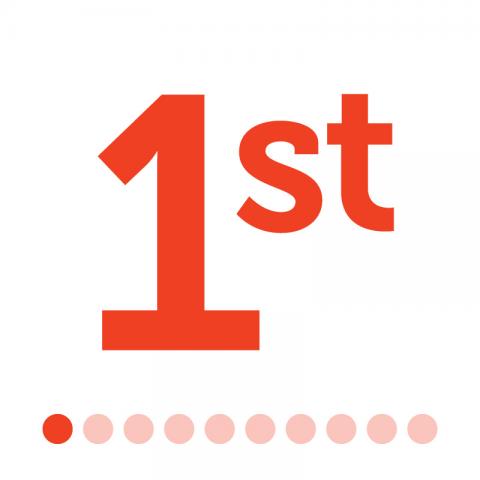
Ordinale getal / “Ordinal number”
3. Afrikaans Intermediate Words – BYVOEGLIKE NAAMWOORDE / “Adjectives”
As we explained in the Afrikaans Beginner Word article, adjectives are those words that tell us more about nouns.
Can you remember the two types of adjectives and how to identify them? Yes, that’s right—their classification depends on where they are placed in a sentence.
- ★ Attributive adjectives are called attributiewe byvoeglike naamwoorde in Afrikaans, and they always come in front of a noun:
Die mooi dag is verby. / “The lovely day is over.”
- ★ Predicative adjectives are called predikatiewe byvoeglike naamwoorde in Afrikaans, and they always stand after a linking verb:
Die dag is mooi. / “The day is lovely.”
Attributive adjectives are often modified in Afrikaans. Take a look at these examples and see if you can spot the modifications when compared to predicative adjectives.
- ★ Dit is ‘n lieflike dag. / “It’s a beautiful day.” vs. Die dag is lieflik. / “The day is beautiful.”
- ★ Daardie is ‘n interessante les. / “That’s an interesting lesson.” vs. Daardie les is interessant. / “That lesson is interesting.”
- ★ Die buitenste klaskamer / “The outside classroom” vs. Die klaskamer is buite. / “The classroom is outside.”

Dis ‘n pragtige dag vandag. / “It’s a beautiful day today.”
Don’t worry too much about the rules governing these modifications right now; they can get pretty complex, as these things go.
Here’s a list of some of the most common intermediate Afrikaans adjectives.
| Byvoeglike Naamwoorde / “Adjectives” | ||
| Afrikaans Predicative Adjectives | English | Afrikaans Attributive Adjectives n/a = it remains the same as the predicative |
| onsuiwer | “impure” | n/a |
| lank | “long” | lang |
| enorm | “enormous” | enorme |
| opgewonde | “excited” | n/a |
| vervelig | “boring” | vervelige |
| glad | “smooth” | gladde |
| grof | “rough” OR “gruff” | growwe |
| intelligent | “intelligent” | intelligente |
| onduidelik | “unclear” | onduidelike |
| suiwer | “pure” | n/a |
| dapper | “courageous” | n/a |
| braaf | “brave” | brawe |
| antiek | “ancient” / “antique” | antieke |
| oud | “old” | ou |
| kunsmatig | “artificial” | kunsmatige |
| gerieflik | “convenient” | gerieflike |
| ongerieflik | “inconvenient” | ongerieflike |
| ideaal | “ideal” | ideale |
| absoluut | “absolute” | absolute |
| opwindend | “exciting” / “thrilling” | opwindende |
| outyds | “old-fashioned” | outydse |
| modern | “modern” | moderne |
| buitengewoon | “extraordinary” | buitengewone |
| ongewoon | “uncommon” | ongewone |
| spesiaal | “special” | spesiale |
| gelukkig | “happy” / “lucky” | gelukkige |
| walglik | “disgusting” | walglike |
| kleurvol | “colorful” | kleurvolle |
| bleek | “pale” | n/a |
| groen / geel / pers / oranje / wit / swart | “green” / “yellow” / “purple” / “orange” / “white” / “black” | n/a |

Die jong meisie het ‘n mooi glimlag. / “The young girl has a pretty smile.”
4. Afrikaans Intermediate Words – Voornaamwoorde / “Pronouns”
We’re still sort of busy dealing with nouns! Can you recall what a pronoun is?
To refresh your memory—pronouns are words that take the place of nouns in a phrase or sentence, denoting the same gender and number as the nouns they replace.
Pronouns have a cool function, because their use ensures that sentences don’t become too cluttered or nouns too repetitive. We dealt with the basic personal pronouns in the Beginner Afrikaans article, though you might also want to read our blog post on Afrikaans pronouns for more information.
In this article, we’re going to get a closer look at the different types of pronouns. For most types, you can determine who or what they refer to from the context.
- Persoonlike voornaamwoorde, voorwerp en onderwerp / “Personal pronouns, object and subject”
- Besitlike voornaamwoorde / “Possessive pronouns”
- Aanwysende voornaamwoorde / “Demonstrative pronouns”
- Onbepaalde voornaamwoorde / “Indefinite pronouns”
- Vraende voornaamwoorde / “Interrogative pronouns”
| 1. Persoonlike Voornaamwoorde – Voorwerp & Onderwerp / “Personal Pronouns” – Subject & Object Intermediate students need to add only one more formal personal pronoun to those listed for beginners. The same pronoun is used for both the subject and the object in sentences with this pronoun, as well as for both singular and plural forms. | |
| Afrikaans | English |
| u | “you” |
Subject:
Object:
This formal form of address is still common in Afrikaans, but its use will depend on the context. Use it when first addressing someone you don’t know well and who is much older than you, such as your new Afrikaans friend’s grandparents or elderly parents. Also use this pronoun when addressing someone greatly senior to you in terms of age and work title, such as your much older CEO at work. Always address a VIP or dignitary this way, such as the country’s president or an officer of the law. This is a sure sign of respect. In certain upmarket hospitality settings, the staff is sometimes trained to address patrons this way. Often, you will be invited to drop this formal way of speaking, but make sure you wait for the invitation to do so! For more information, also look at this lesson about Afrikaans greetings. | |
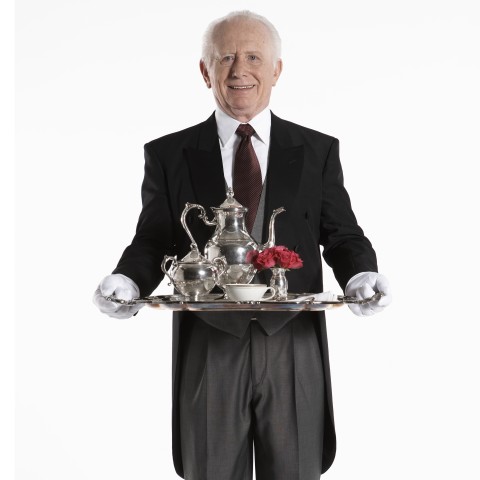
Hierdie tee is vir u, Meneer. / “This tea is for you, Sir.”
| 2. Besitlike Voornaamwoorde / “Possessive Pronouns” As the name suggests, these pronouns indicate possession. When they’re used with another pronoun in a sentence, the context needs to be clear so that it’s understood what they refer to. We looked at the basic possessive pronouns in the beginner article. Here, I’m listing the modified pronouns, which change according to the sentence structure. | |
| Afrikaans | English |
| myne | “mine” |
| joune | “yours” (singular) |
| u s’n | “yours” |
| syne | “his” |
| hare | “hers” |
| julle s’n | “yours” (plural) |
| ons s’n | “ours” |
| hulle s’n | “theirs” |
| |
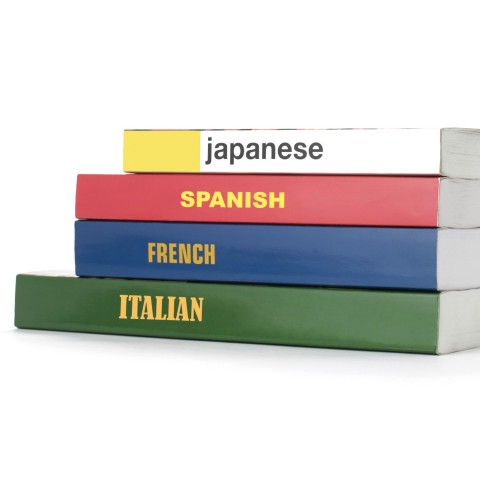
Die handboek is myne. / “The textbook is mine.”
| 3. Aanwysende Voornaamwoorde / “Demonstrative Pronouns” In sentences, these pronouns are used to indicate something specific. | |
| Afrikaans | English |
| hierdie Note: This is a compound of hier (“here”) and die (“this”). It’s used with both singular and plural nouns. Hierdie vrae is maklik. | “this” / “these” “These questions are easy.” |
| daardie Note: This is a compound of daar (“there”) and die (“this”). It’s used with both singular and plural nouns. Daardie sinne is lank. Daardie toets is maklik. | “that” / “those” “Those sentences are long.” “That test is easy.” |
| daai Note: This is a contraction of daar (“there”) and die (“this”). It means “those” and “that.” In other words, it remains the same for singular and plural nouns in sentences. Daai notas help baie.Daai is ‘n oulike onderwyser. | “that” / “those” [slang] “Those notes help a lot.” “That is a nice teacher.” |
| hierdies (“these”) daardies (“those”) daais (slang for “those”) Note: When these pronouns get the suffix -s, they always indicate a plural or collective noun (or nouns). “Indicate,” because the subject is always implied in the sentence. In other words, unlike the English “these” and “those,” hierdies, daardies, and daais are never used together with a noun in sentences. Therefore, the context of the sentence must be clear. Hierdies is baie ryp. (Talking about fruit, e.g.) Daardies is moeilik. (Talking about tests, e.g.) Daais help baie. (Talking about notes, e.g.) | “these” / “those” “These are very ripe.” “Those are difficult.” “Those help a lot.” |
| albei / beide Albei is siek. | “both” “Both are ill.” |

Hierdie foon / “This phone”
| 4. Onbepaalde Voornaamwoorde / “Indefinite Pronouns” These are sometimes confused with demonstrative pronouns, but as the name suggests, they point to the general. | |
| Afrikaans | English |
| alles | “everything” |
| almal | “everybody” |
| elke Note: This is an irregular indefinite pronoun that is only used with singular nouns. | “every” |
| alle Note: This is another irregular pronoun that is always used with plural or collective nouns. | “all” |
| iemand | “somebody” |
| niemand | “nobody” |
| |

Elke student het ‘n handboek. / “Every student has a textbook.”
| 5. Vraende Voornaamwoorde / “Interrogative Pronouns” These pronouns are used to ask short, succinct questions. Like in English, they can be used on their own as a simple, interrogative expression if the context is clear. | |
| Afrikaans | English |
| Waarom? / Hoekom? | “Why?” |
| Hoe? | “How?” |
| Waarmee? | “With what?” |
| Waarvoor? | “What for?” |
| Watter? | “Which?” |
| |

Hoekom? / “Why?”
5. Afrikaans Intermediate Words – WERKWOORDE / “Verbs”
Verbs are, simply put, the “doing words” of most languages. Just like in the Beginner Afrikaans article, I’ll only supply independent verbs in the present tense here. To learn more about their conjugations for the past and future tenses, be sure to study this article too.
| Hoofwerkwoorde / “Independent Verbs” | |
| Afrikaans | English |
| aankom | “arrive” |
| vertrek | “depart” |
| begin | “begin” / “start” |
| eindig / stop | “end” / “stop” |
| bespreek | “book” / “reserve” / “discuss” |
| skep | “create” |
| vernietig | “destroy” |
| mors | “spill” / “make a mess” |
| glip | “slip” |
| gly | “slide” |
| skud | “shake” |
| spring | “jump” |
| vernietig | “destroy” |
| beskadig | “damage” |
| breek | “break” |
| blameer | “blame” |
| aanvaar | “accept” |
| onderrig | “teach” |
| bied (lesse) aan | “give lessons” |
| verstaan | “understand” |
| skoonmaak | “tidy up” / “clean up” |
| studeer | “study” |
| hersien | “revise” |
| neem notas | “take notes” |
| motiveer | “motivate” |
| verbeter | “improve” |
| verdien | “deserve” / “earn” |
| verminder | “reduce” |
| vermag | “achieve” |
| oorweeg | “consider” |
| vervoer | “transport” |
| stoor | “store” |
| stuur | “send” |
| vervaardig | “manufacture” |
| produseer | “produce” |
| ontwerp | “design” |
| |

Sy studeer buite. / “She’s studying outside.”
5.1 MODALE WERKWOORDE / “Modal Verbs”
One helpful definition of a modal verb is that it’s used to express:
- ability;
- possibility;
- permission, or
- obligation.
Modal verbs are auxiliary verbs that always appear with the main verb in sentences.
That sums it up neatly!
| Modale Werkwoorde / “Modal Verbs” | |
| Afrikaans | English |
| kan | “can” |
| moet | “must” |
| sal | “will” |
| wil | “want to” |
| mag | “might” / “may” |
| |

Hy wil leer swem. / “He wants to learn (how to) swim.”
6. Afrikaans Intermediate Words – KOPPELWERKWOORDE / “Linking Verbs”
Can you recall the definition of a linking verb? Great! As its name suggests, it links the subject in a sentence to a word or phrase that describes the subject.
| Koppelwerkwoorde / “Linking Verbs” | |
| Afrikaans | English |
| heet Note: This is a slightly more formal linking verb that’s still used in Afrikaans academic circles and by older Afrikaner folks. | “is called” |
| word | “become” |
| was | “was” |
| |

Sy was suksesvol. / “She was successful.”
7. Afrikaans Intermediate Words: BYWOORDE / “Adverbs”
As explained in the Beginner Afrikaans article, adverbs modify verbs. They often double as adjectives too, but adjectives are recognized in a sentence when they qualify the noun and/or by the presence of a linking verb, such as is (“is”) or was (“was”).
We’re going to look at:
- A. Bywoorde van tyd (“Adverbs of time and frequency”)
B. Bywoorde van graad (“Adverbs of degree”)
C. Bywoorde van plek (“Adverbs of place”)
D. Bywoorde van wyse (“Adverbs of manner”)
| Bywoorde van Tyd / “Adverbs of Time and Frequency” | |
| Afrikaans | English |
| smiddae | “in the afternoon” |
| saans | “in the evening” |
| smorens | “in the morning” |
| heeldag | “all day” |
| heelnag | “all night” |
| vroeg / vroëer | “early” / “earlier” |
| laat / later | “late” / “later” |
| soms | “sometimes” |
| altyd | “always” |
| gewoonlik | “usually” |
| baiekeer | “often” |
| tans | “currently” |
| laas | “last” |
| |

Laas Kersfees was ons in Switserland. / “Last Christmas, we were in Switzerland.”
| Bywoorde van Graad / “Adverbs of Degree” These adverbs are often used to answer the question “How much?” Just like in English, they indicate the intensity of an action. | |
| Afrikaans | English |
| redelik | “pretty” / “fairly” |
| erg / baie | “very” |
| byna | “nearly” |
| amper | “almost” |
| besonder | “exceptionally” / “extraordinarily” |
| heeltemal | “completely” |
| gladnie | “not at all” |
| totaal | “totally” |
| |

Die wind voel besonder koud. / “The wind feels exceptionally cold.”
| Bywoorde van Plek / “Adverbs of Place or Position” These adverbs are often used to tell you where an action is performed. | |
| Afrikaans | English |
| binnekant | “inside” |
| binnetoe | “to the inside” |
| buitekant | “outside” |
| buitetoe | “to the outside” |
| hierheen | “here” / “this way” |
| daarheen | “there” / “that way” |
| huistoe | “home” / “homeward” |
| werk toe | Literally: “work to” / “to work” |
| |

Ons gaan huistoe. / “We are going home.”
| Bywoorde van Wyse / “Adverbs of Manner” Just like in English, almost all adverbs can be used as adjectives too. Unlike in English, though, Afrikaans adverbs usually remain the same. | |
| Afrikaans | English |
| helder | “brightly” |
| moeilik | “with difficulty” |
| maklik | “easily” |
| vrolik | “cheerfully” |
| hartseer | “sadly” |
| gretig | “eagerly” |
| getrou | “faithfully” |
| gelukkig | “fortunately” |
| opgewonde | “excitedly” |
| skaam | “shyly” |
| eerlik | “honestly” |
| oneerlik | “dishonestly” |
| skuldig | “guiltily” |
| onskuldig | “innocently” |
| veilig | “safely” |
| onveilig | “unsafely” |
| warm | “warmly” |
| koud | “coldly” |
| kwaai / kwaad | “angrily” |
| angstig | “anxiously” |
| bang | “scared” |
| gemaklik | “comfortably” |
| lui | “lazily” |
| versigtig | “carefully” |
| lomp | “clumsily” |
| saggies | “gently” / “softly” |
| jaloers | “jealously” |
| vorentoe | “forward” |
| agtertoe | “backward” |
| |

Bywoord / “Adverb”
8. Afrikaans Intermediate Words: Voegwoorde / “Conjunctions”
As their name suggests, conjunctions bring words, sentences, or different parts of sentences together. Voeg is a verb in Afrikaans that means “to join” or “to put together.”
To learn more, be sure to read this article on Afrikaans conjunctions.
| Afrikaanse Voegwoorde / “Afrikaans Conjunctions” | |
| Afrikaans | English |
| daarom | “therefore” |
| anders | “otherwise” |
| nogtans | “nevertheless” / “still” |
| al | “although” / “even if” |
| sodat | “so that” |
| voor | “before” |
| terwyl | “while” |
| tot / totdat | “until” / “till” |
| na / nadat | “after” |
| |

Borsel jou tande nadat jy geëet het. / “Brush your teeth after you’ve eaten.”
9. Afrikaans Intermediate Words – VOORSETSELS / “Prepositions“
If you can remember from the Beginner Afrikaans article, prepositions indicate the “relative position or relationship between two separately expressed concepts.”
And remember not to confuse them with adverbs of position or place!
| VOORSETSELS / “Prepositions” | |
| Afrikaans | English |
| van | “of” |
| langs | “next to” |
| in | “in” |
| aan | “to” |
| |

Sit langs my. / “Sit next to me.”
Learn the Most Common Afrikaans Intermediate Words Easily at AfrikaansPod101.com!
Was that difficult? Let us know in the comments. It’s our pleasure to help you learn Afrikaans beginner and intermediate words—we like to keep things easy and fun!
Also, if you haven’t already, be sure to sign up for membership and get immediate access to the following:
1. The Afrikaans Core 100 Word List
2. A new Afrikaans word to learn every day
3. An extensive vocabulary list, regularly updated
4. A free Afrikaans online dictionary
5. Monthly video talks and shows to help you learn easier and faster while staying motivated
Don’t hesitate—subscribe now!
About the author: Christa Davel is a bilingual (Afrikaans and English) freelance writer and journalist, and is currently based in Cape Town, South Africa. She’s been writing for InnovativeLanguage.com since 2017.













